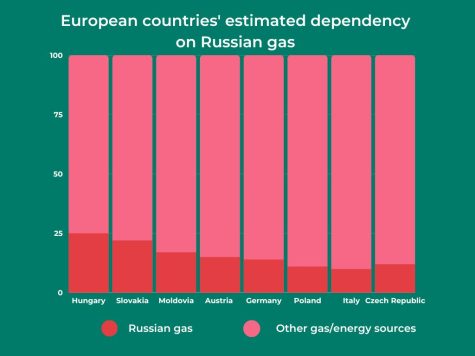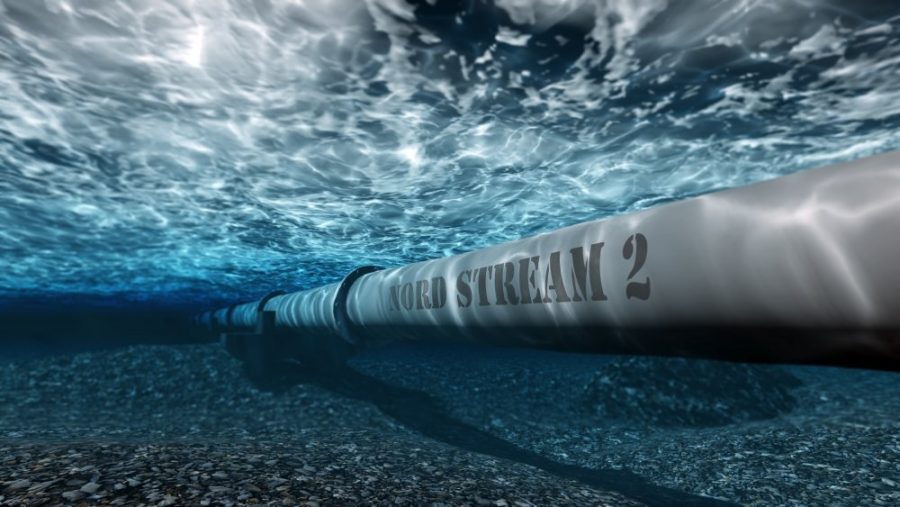Nord Stream pipeline leaks questions sabotage
Leaks in the Nord Stream 1 and Nord Stream 2 pipelines turned up after recorded activity consistent with explosions. These leaks come as Europe faces an energy crisis within the Russian and Ukraine conflict and pressure for energy demand in the future. The catastrophic environmental impact of the leaks also contributes to the growing issue of climate change. The pipelines supplied natural gas all over Europe but stopped in August after months of gas reduction from Russia’s state-controlled company, Gazprom, cut off supply. The North Atlantic Treaty Organization (NATO) brought the speculation of sabotage. While no government formally blames any parties, talks of Russia’s involvement as the cause speculates around Europe.
October 14, 2022
September 26, reports of sudden drops in pressure in the Nord Stream 2 gas pipeline alerted the possibility of a leak, which followed the Danish Energy Authority to release a statement that a leak appeared in the pipeline in Danish waters. The following day, Sweden notified leaks in Nord Stream 1 and Nord Stream 2 that operate under the Baltic Sea near Sweden and Denmark. This came after reports from the Swedish National Seismic Network detected underwater explosions near the pipelines before the damage from a leak occurred in various places. Additionally, Swedish seismologists recorded activity that they claimed looked consistent with an explosion rather than a natural occurrence. Several European nations and North Atlantic Treaty Organization (NATO) officials claim sabotage as the likely cause although Russia holds back ruling it out, despite constructing the gas networks.
The two pipelines run natural gas from Russia to Germany, supplying countries along Western Europe. Speculation points to Russia, as Gazprom, Russia’s state-controlled energy company mainly owns the pipelines. The leaks also arrived the same day as the Baltic Pipe inauguration at its opening ceremony, a new route that supplies gas from Norway to Poland. The new pipeline brought the promise of diversifying energy and swaying away from dependence on Russia’s supply. Previously, Russia reduced the amount of gas flowing through the Nord Stream 1 pipeline in the summer months until cutting off the pipeline completely with Gazprom in August, blaming equipment issues and international sanctions on Russia. Nord Stream 2 never went into service when Germany killed the project prior to the invasion of Ukraine. By not posing an immediate effect on the European energy supply, this adds promise to the end of all Nord stream pipeline projects, which spanned over two decades and growing Europe’s reliance on Russia’s gas supply.
As of now, no governments officially blame any parties for the damage. Officials in Europe pointed the finger at Russia for the attack, as two German lawmakers accused Russia of the suspected sabotage. The European Union (EU) previously stated that they believe Russia uses blackmail and threats to try weaponizing energy, as Europe relies heavily on Russia’s gas supply. Kremlin spokesperson Dmitry Peskov called accusations of Russian sabotage stupid and absurd. Investigations of the cause and origin of the leaks come from several countries like Sweden, Denmark, and Germany. October 6, Sweden’s Domestic Security agency confirmed in their investigation that detonations caused serious damage to both pipelines and collected evidence from the sites. The Kremlin mentioned investigations must include Russia’s involvement on October 5. This came after Russian President Vladimir Putin accused the West of sabotaging the pipeline in an effort to destroy European energy infrastructure and further attack Russia. The Biden administration dismissed Putin’s claims and described them as misinformation.
“We, obviously, will be waiting for some clarification on that as we believe that, definitely, participation of the Russian side in examining the damaged area and investigating what happened should be mandatory,” Kremlin spokesman Dmitry Peskov said.
Before the Russo-Ukraine war, Russian gas comprised 40% of the European gas supply, but came down significantly to 9% after the invasion. Since the reduction of Nord stream gas supply, European leaders searched for alternative sources within other countries. Without the reliance on cheap gas supplied by Russia, European industries faced reductions and closures. The addition of the leaks, it placed more uncertainty with the accessibility and the rising cost of energy. The impending cold winter on Europe’s back brings fear of incapability to keep citizens warm when temperatures drop and pressure from high demand for winter energy will drain Europe’s gas storages and reserves.
October 2, the Danish Energy Agency notified the public that the series of leaks in both Nord Stream pipelines officially stopped. The leak brings the title of the greatest single release of methane on record. Although Nord Stream 1 and Nord Stream 2 pipelines did not actively transport gas when the explosions happened, the lines still contained vast amounts of natural gas.

“It really depends on the amount of quantity how far it goes up in the stratosphere because we do know that with your, kind of like super carbons and greenhouse gasses there they can definitely create warming. It’ll be interesting to see where that kind of hovers around the world some areas might extend end up with a hotter climate, others might be colder, and some areas might not be affected at all but it’ll be interesting to see what the data says by the scientists,” Zoology teacher Sue Aughey said.







